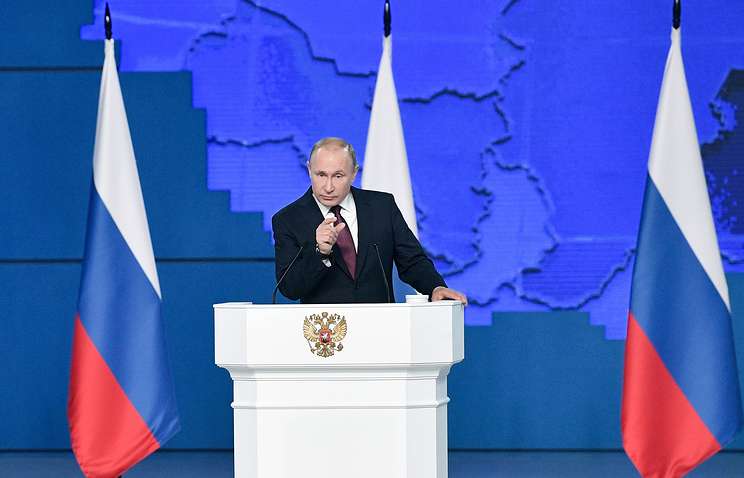The missile will be aimed at the United States? Russian Presidential Spokesman: Putin didn’t say that.

Peskov. (Photo: Tass)
Overseas networkFebruary 25 thPeskov, spokesman of Russian President, told the media on Monday (25th) that although Russian President Vladimir Putin announced in his annual State of the Union address submitted to the Russian Federal Parliament on February 20th that Russia would deal with the medium-range and short-range missiles that the United States might deploy in Eastern Europe in proportion, Putin did not directly point out any geographical locations that Russian missiles might target.
According to the Tass news agency, peskov pointed out that if Russia is threatened and deployed with medium-range and short-range missiles near its border, Russia must respond accordingly. Russian missiles will not only target launchers, but also target the territory where the decision-making center is located. However, he changed the subject and pointed out that "please remember that President Putin did not mention a geographical name in this regard".
According to reports, after Putin finished his State of the Union address last week, Russian Channel 1 (Rossiya-1) speculated that Russian missiles might be aimed at targets in the United States. Peskov declined to comment on this. He said that in this special case, this question should be directed at Russian Channel 1, which broadcasts programs. Why do they think so?

Putin warned that Russian missiles will be aimed at missile launch sites and deployment decision-making sites. (Photo: Tass)
According to an overseas network report earlier, on February 20th, local time, Putin issued an annual State of the Union address warning that if the United States deploys short-and medium-range missiles in Europe, Russia will be forced to take the same measures to aim the missiles at "missile deployment sites" and "deployment decision sites". Putin accused the United States of sabotaging Intermediate-Range Nuclear Forces Treaty, saying that the United States has been violating the agreement in subtle ways, such as deploying a land-based Aegis system compatible with Tomahawk in Eastern Europe. The United States should honestly put forward the basis for its withdrawal from Intermediate-Range Nuclear Forces Treaty, instead of making irresponsible accusations against the Russians.
Putin stated that Russia will not take the lead in deploying short-and medium-range missiles in Europe, but if the United States deploys such missiles in Europe, Russia will be forced to take equal and asymmetric measures. Russia will not only target the missile launch site, but also target the "decision-making place for deploying missiles." Putin also stressed that Russia’s military actions are defensive in nature in response to the reaction of the United States and its allies, aiming at dispelling other countries’ delusions of using force against Russia. "Russia wants peace."
It is understood that Intermediate-Range Nuclear Forces Treaty’s full name is the Treaty between the United States and the Soviet Union on the Elimination of Medium-range and Short-range Missiles between the Two Countries, which was signed by US President Ronald Reagan and Soviet leader Mikhail Gorbachev in Washington on December 8, 1987. The treaty prohibits both sides from testing, producing and deploying land-based cruise missiles and ballistic missiles with a range of 500 to 5,500 kilometers, but does not impose restrictions on sea-based and air-launched cruise missiles and ballistic missiles.
In recent years, the United States and Russia have repeatedly accused each other of violating the treaty. On October 20th last year, US President Trump said that the United States intended to withdraw from Intermediate-Range Nuclear Forces Treaty, and said that the United States needed to develop weapons restricted by the Treaty. Russia responded that if the United States withdraws from Intermediate-Range Nuclear Forces Treaty, it will develop "unique weapons".
On January 15th this year, Russia and the United States held an inter-agency consultation on Intermediate-Range Nuclear Forces Treaty, but the two sides failed to reach an agreement. On February 1st, US President Trump and Secretary of State Pompeo announced that the implementation of Intermediate-Range Nuclear Forces Treaty would be suspended from February 2nd. The United States is determined to withdraw from the Treaty within six months unless Russia resumes its "true and verifiable" compliance with the Treaty. On February 2, Russian President Vladimir Putin announced that Moscow would also suspend the agreement in response to the same move by the United States. Putin also issued instructions not to negotiate with Washington on this issue, and stressed that the United States needs to show the sincerity of equality and substantive dialogue. (Compile/Overseas Network Hou Xingchuan)